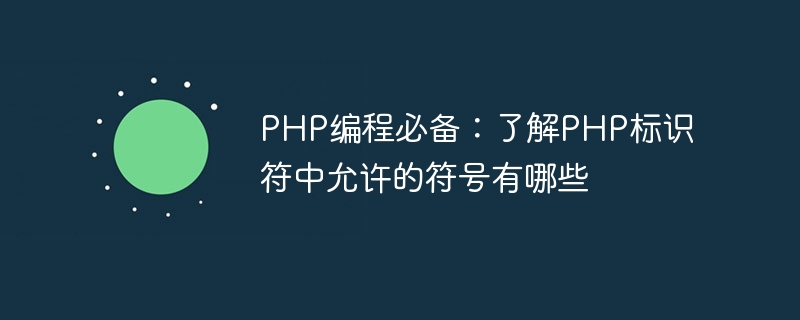
Required for PHP programming: To understand what symbols are allowed in PHP identifiers, you need specific code examples
In PHP programming, identifiers are used to identify variables , functions, classes and other user-defined named entities. Identifiers usually consist of letters, numbers, and underscores, and must follow certain naming rules. In addition to the common letters, numbers, and underscores, PHP also allows the use of some special symbols in identifiers. This article will detail the symbols allowed in PHP and provide specific code examples.
- Underscore (_)
Underscore is the most common and simplest identifier symbol in PHP. It can be used to concatenate multiple English words or a combination of English words and numbers to improve the readability of the identifier. Here is a sample code using underscores:
$user_name = "John Smith";
Copy after login
- Dollar sign ($)
The dollar sign is used to define variable names. In PHP, all variables must start with a dollar sign, followed by a legal identifier character. The following is a sample code using the dollar sign:
$age = 30;
Copy after login
- Arrow symbol (->)
The arrow symbol is mainly used to access the properties and methods of an object. When an object is an instance of a class, you can use arrow notation to refer to the object's properties and methods. The following is a sample code using arrow notation:
class Person { public $name = "John"; public function sayHello() { echo "Hello, my name is " . $this->name; } } $person = new Person(); $person->sayHello();
Copy after login
- Double colon (::)
The double colon notation is used to call static properties and methods of a class. In PHP, the double colon is also known as the range resolution operator. The following is a sample code using double colon:
class Math { public static function add($a, $b) { return $a + $b; } } $result = Math::add(5, 3); echo $result;
Copy after login
- Question mark plus colon (?:)
The question mark plus colon symbol is the conditional expression operator in PHP, also known as is the ternary operator. It is used to select different values or execute different statements based on the true or false value of a condition. The following is a sample code that uses question marks plus colons:
$age = 18; $is_adult = ($age >= 18) ? "成年人" : "未成年人"; echo $is_adult;
Copy after login
- Single quotes (')
Single quotes are used to represent string literals, and the contents inside will be output as is, No variable substitution or escape character parsing occurs. The following is a sample code using single quotes:
$name = 'John Smith'; echo 'My name is ' . $name;
Copy after login
- Double quotes (")
Double quotes are used to represent string literals, the content of which can contain variables or escapes Characters. The following is a sample code using double quotes:
$name = 'John Smith'; echo "My name is $name";
Copy after login
The above are some common symbols allowed in PHP and their sample codes. Of course, PHP also allows the use of more symbols, such as the period (.) is used for string concatenation, comma (,) is used to separate array elements, etc. During the programming process, being familiar with the use of these symbols will help improve the readability of the code and programming efficiency.
The above is the detailed content of Knowledge that must be mastered in PHP programming: Symbols allowed by PHP identifiers and their understanding. For more information, please follow other related articles on the PHP Chinese website!






